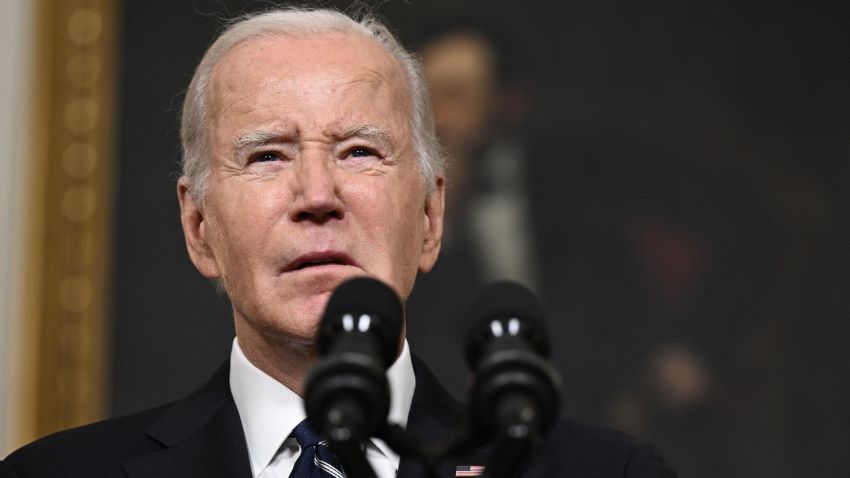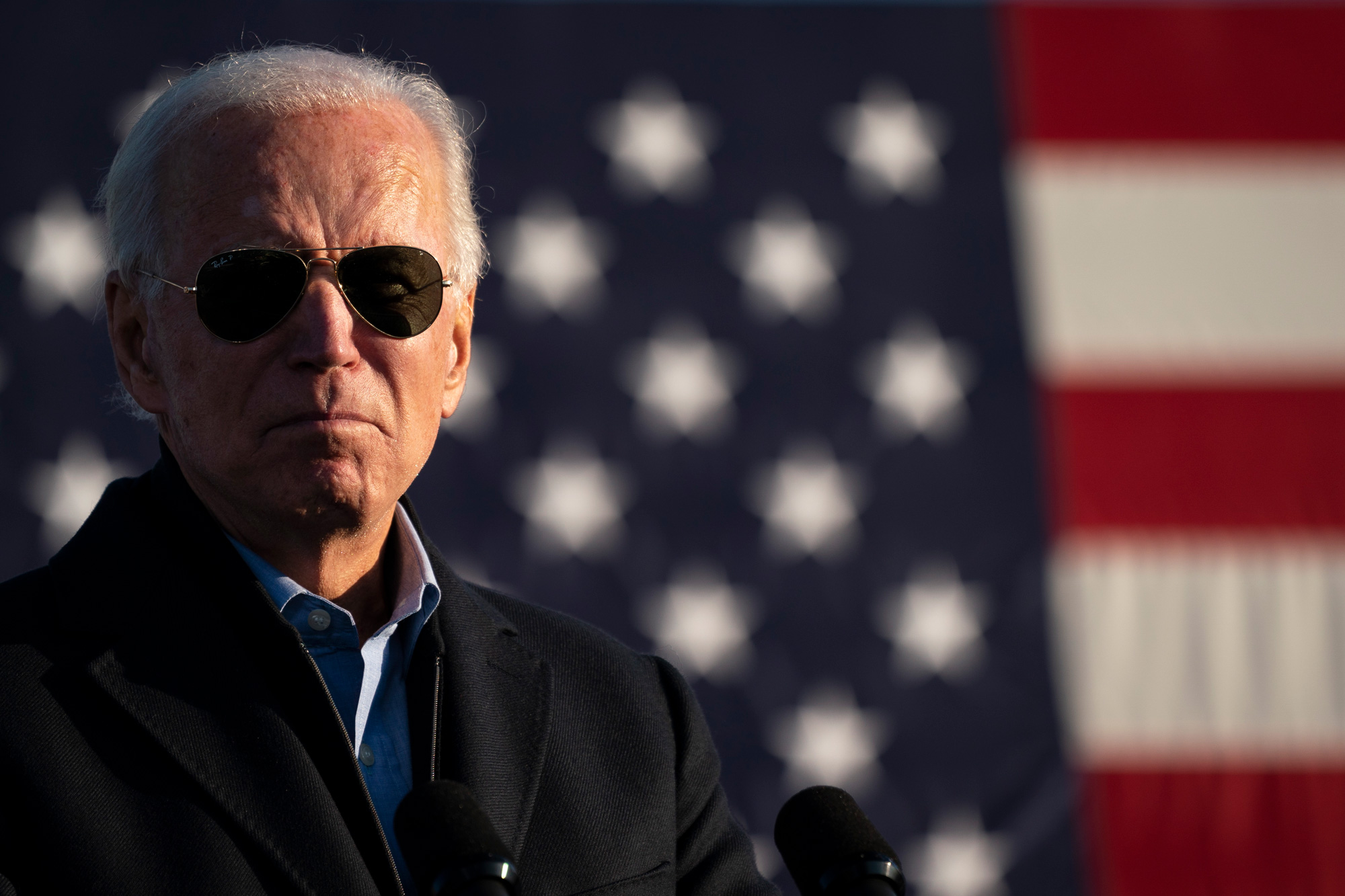
Americans Don’t Want a Wartime President
Mark Hannah / Foreign Policy
(June 6, 2024) — If Biden can avoid the temptation to be a warrior defending allies abroad, he might have a better chance at winning his battles at home.
U.S. President Joe Biden pitches his bid for reelection as a defense of American democracy itself. It’s a shrewd strategy as his opponent displays an awkward affection for autocrats.
However, with a speech in France this week commemorating the anniversary of D-Day and “the importance of defending freedom and democracy,” his team might be signaling a strategy of portraying Biden as a bulwark of democracy not just at home, but also across the globe—especially while wars in Ukraine and the Middle East likely grind on through election day. An Institute for Global Affairs survey that my colleagues and I published this week strongly suggests this could be a strategic mistake.
U.S. President Joe Biden pitches his bid for reelection as a defense of American democracy itself. It’s a shrewd strategy as his opponent displays an awkward affection for autocrats. However, with a speech in France this week commemorating the anniversary of D-Day and “the importance of defending freedom and democracy,” his team might be signaling a strategy of portraying Biden as a bulwark of democracy not just at home, but also across the globe—especially while wars in Ukraine and the Middle East likely grind on through election day.
An Institute for Global Affairs survey that my colleagues and I published this week strongly suggests this could be a strategic mistake.
During the State of the Union address in March, Biden warned that U.S. democracy is more “under assault” than it has been at any time since the Civil War. This reality should be rousing enough on its own. But he diluted the message by swiftly tying it to attacks on democracy overseas by referring to Russia’s invasion of Ukraine, turning a powerful political proposition into a less salient one for American voters.

The Biden administration’s rhetoric has upped the ante. In its telling, the war in Ukraine is not simply a regional conflict with very particular historical origins but part of an existential global battle between democracy and autocracy. This ideological framing has flustered some on Biden’s own national security staff, who see Ukraine’s fight as a straightforward defense of its sovereignty and independence rather than a noble struggle against autocracy on behalf of the free world.
When I mentioned that Secretary of State Antony Blinken must know that this framing distorts the essential dynamics of the conflict, one senior White House staffer confided, on the condition of anonymity, that it was coming directly from the Oval Office.
Why might Biden wage an international crusade for democracy when preserving it at home seems pressing enough? In the 20 years since combat veteran John Kerry lost a presidential election to draft evader George W. Bush, chastened Democrats have made a concerted effort to reassert themselves as the tough-on-defense party. I witnessed this conversion up close shortly after working on Kerry’s campaign.
From the ashes of the 2004 defeat sprang organizations dedicated to strengthening Democratic national security bona fides. But decades of Democratic hawks and neoconservative Republicans trying to out-flex each other left the American public war-weary amid a dismal record of unsuccessful and counterproductive conflicts.
While many U.S. voters certainly want a strong national defense and have always been quick to support measures to defeat direct threats, such as the Soviet Union or al Qaeda, Americans have never been eager for their country to act as the sword and shield of democracy globally. In April, when my colleagues and I at the Institute for Global Affairs asked voting-age Americans about the goals that the United States should prioritize in Ukraine, only about half as many wanted to deter autocracies from invading democracies as those who wanted to avoid risking a confrontation between nuclear-armed powers. Likewise, twice as many respondents wanted Washington to prioritize avoiding escalation into a wider regional war compared to those who wanted to prioritize restoring Ukraine’s pre-invasion borders.

At a moment when Ukrainian morale and momentum is [sic] sagging and Russian President Vladimir Putin reportedly seeks a cease-fire and the resumption of peace talks, we found broad support in the United States for NATO countries urging a negotiated settlement. Lest this be dismissed as mere U.S. provincialism or apathy for foreign affairs, it’s worth noting that we also surveyed residents of NATO’s three largest economies besides the United States: Germany, the United Kingdom, and France. A majority of respondents from these European publics also wanted to push for a negotiated settlement.
There are some significant differences between the rationales of U.S. and European respondents—for example, more Americans worry about Ukraine losing leverage, while more Europeans think the West doesn’t have the industrial capacity to protect itself and Ukraine. But the notion that the war is Ukraine’s fight, so we should abstain from trying to influence it—a recurring talking point of the Biden administration—won agreement from fewer than 1 in 5 people on either side of the Atlantic.
Biden could persuasively make the case that another Donald Trump presidency would threaten the United States’ long-standing alliances. Indeed, Trump bizarrely encouraged Russia to do “whatever the hell they want” to NATO allies who shirk on their spending commitments.
But caution is warranted here too. A sizable majority of respondents in the United States—and in the three NATO member countries that we surveyed—said they want Europe to be primarily responsible for its own defense. In fact, nearly three times as many Europeans said they seek a neutral relationship with the United States as respondents who wanted Washington to be primarily responsible for Europe’s defense. The high-minded paeans to a United States indispensable to European security might have resonated throughout most of Biden’s political career, particularly during the Cold War, but they fall flat today.
Nor does the war in Gaza present many openings for Biden to present himself as a champion of democracy and an international order based on liberal norms. Israel’s conduct in its war against Hamas has led the International Court of Justice to warn against genocidal acts and order a halt to its military operation in Rafah“immediately.”
Our poll found that 42 percent of Americans thought that Israel should agree to a lasting cease-fire, significantly more than the 28 percent who said that the West must support Israel’s defense. Meanwhile, a new poll conducted by the Pew Research Center in March and April found that even roughly three-quarters of Israelis wanted the United States to play a major diplomatic role in ending their war, and more think that Biden excessively favors them than think that he excessively favors the Palestinians.
Biden is certainly right to be worried about the state of democracy around the world. Authoritarians persist in their pursuit of odious ends. Democratic backsliding and populist backlash against globalization afflict many countries besides his own. But Americans simply don’t show much enthusiasm for a warrior-president focused on defending democracy in Ukraine, Israel, or likely any other distant country. If Biden can avoid the temptation to be one, he’ll be better able to neutralize the main threat to democracy in the United States: the one who joins him on the ballot in November.
Mark Hannah is a senior fellow at the Institute for Global Affairs.